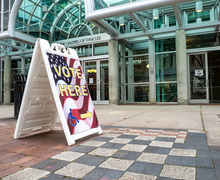Liberal : Creating a national identification card would simplify many processes
Gov. Andrew Cuomo is pushing to expand New York’s DNA database to help solve crimes, yet there are doubts as to where the government’s limit is to collect DNA information.
In New York state, only convicted felons and some individuals convicted of misdemeanors can be put into the state’s DNA database. But a growing number of crimes have been solved with the help of DNA evidence as a direct result of the database being expanded. Now, Cuomo wants all convicted criminals to enter their DNA into the database. The Senate overwhelmingly passed a bill that puts this requirement into law, the assembly will vote on it soon.
There’s no real stopping point to the want for more DNA into the database. Cuomo and the bill’s supporters have not clearly defined at what point the state will not request DNA. In the future, it’s possible all individuals who have been arrested will be required to submit their DNA. If we are to add only convicted criminals’ DNA into a database, the next logical step would be to include everyone’s DNA into a database.
What might be easier and fairer to all citizens would be to modernize the whole concept of a national identity card. Instead of proving citizenship through a birth certificate, consider a national identity card. The card could both provide birth, genetic and other information, as well as finger prints.
Technology similar to this is already used in other identification cards in the United States. The Transportation Worker’s Identification Credential, an ID card required for the transportation industry, contains a chip with fingerprints and personal information. The information on the card is also in a database.
More developed countries like Estonia use a national identity card with a chip containing vital information. Anyone age 15 and above must have this card. The card can be used to travel within Europe and within the country — public transportation passes in major cities can be loaded onto the card. Taxes are filed through the use of the card. Voting in elections can even be done online with the card.
If everyone was given a national identity card, the continual Republican talking point of voter fraud might finally be put to rest. States across the country are introducing legislation to require voters to present identification as a way to stop voter fraud. But there is no evidence to suggest voter fraud is a major problem. Millions of Americans who have no government-issued ID would be disenfranchised without a scrap of hard data to prove there is a problem. With a national ID, given to all citizens, everyone would be able to vote.
Arguments against a national ID card or expanding the DNA database are primarily rooted in a government that has too much information about an individual. Government already has access to people’s most basic personal data, along with their photograph for passport holders and those with a driver’s license. Adding DNA and fingerprints to one centralized database would not be too much more to ask for and would definitively prove an individual’s identity.
A streamlined national ID, with DNA, could even eliminate the need for the many forms of government ID cards. Credentials like driver’s licenses could be added onto one ID card. A national database could also help solve crimes where there is leftover biological evidence.
Cuomo’s desire to expand the database is only the beginning of what will eventually be a push to incorporate everyone’s DNA. It is hoped our overly complex ID process in the United States could be fixed as well.
Harmen Rockler is a junior newspaper journalism and political science major. His column appears every Monday. He can be reached at horockle@syr.edu.
Published on February 5, 2012 at 12:00 pm





